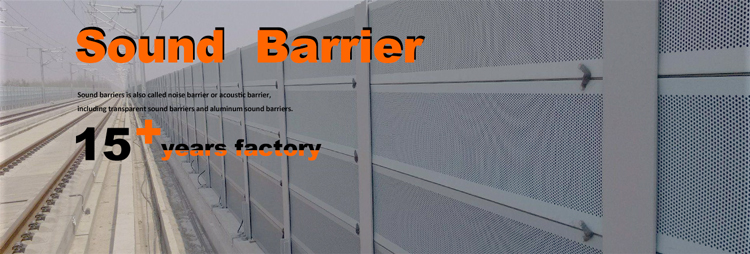Application scenario of noise barrier

A sound barrier, also known as a noise barrier or acoustic barrier, is a structure designed to reduce noise pollution by blocking or absorbing sound waves. It is commonly applied in the following scenarios:
1. Highways and Railways
Sound barriers are widely used along highways and railway tracks to reduce traffic noise. This helps protect residential, commercial, and sensitive areas (such as schools, hospitals, or parks) located near these transport routes.
2. Industrial Areas
Factories, power plants, and other industrial sites often generate high levels of noise from machinery and operations. Sound barriers are used to minimize this noise, ensuring it doesn’t disturb neighboring communities or environments.
3. Urban Construction Sites
In crowded urban areas, temporary sound barriers are set up around construction sites to contain noise from heavy machinery, demolition, and building activities. This helps reduce the noise impact on surrounding businesses and residential areas.
4. Airports
Aircraft noise, especially from takeoffs and landings, can be disruptive to nearby neighborhoods. Sound barriers are strategically installed around airports to shield residential zones from the high decibel levels.
5. Residential and Commercial Areas
In densely populated areas or near sources of persistent noise, sound barriers can be used to improve the quality of life by lowering noise levels for residential complexes or commercial buildings close to highways, railways, or industrial zones.
Sound Transmission Loss (STL) and Sound Insulation Performance
The effectiveness of a sound barrier is often measured by its Sound Transmission Loss (STL) or Sound Insulation Rating, commonly expressed as Sound Transmission Class (STC). This value indicates how well the barrier can block sound. Typical values include:
STC 20-30: Minimal sound reduction, generally insufficient for high-noise areas.
STC 40-50: Significant noise reduction, suitable for areas with moderate noise levels.
STC 60+: Excellent noise insulation, used in high-noise environments like highways and industrial areas.
The performance of a sound barrier depends on factors such as material type, thickness, and height relative to the noise source. The higher the STC rating, the better the sound insulation properties of the barrier.
Inquiry for Our Product
Anping County A.S.O Metal Wire Mesh Products Co, Ltd
E-mail:
sales2@asofence.com
When you contact us, please provide your detail requirements. That will help us give you a valid quotation.